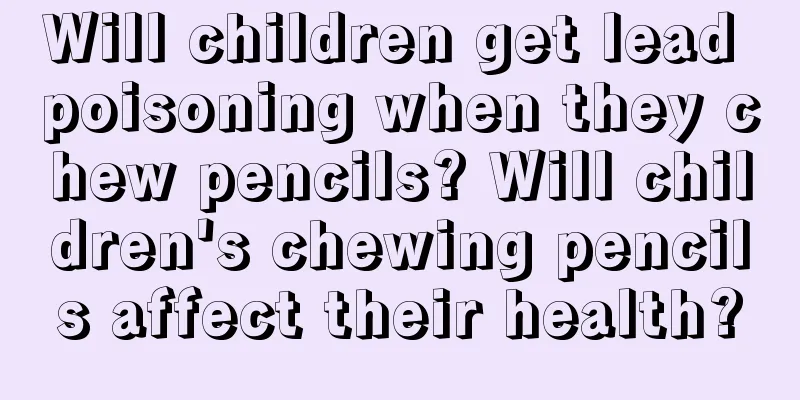Will children get lead poisoning when they chew pencils? Will children's chewing pencils affect their health?

|
Today we find that more and more children are suffering from the harm of lead poisoning. We know that children like to bite pencils, and children biting pencils will cause lead poisoning. This is a big deal. The editor carefully checked and found that biting pencils incorrectly can lead to lead poisoning. How can we prevent it in our lives? Will children get lead poisoning if they chew pencils?Parents can rest assured that there is no lead in the composition of pencils. The core is mainly a form of carbon and is non-toxic. However, he often comes into contact with children who are stabbed by pencils, sometimes five or six in a month, so parents are especially reminded to pay attention to protection. It should be noted that if the pencil core accidentally scratches the face, lips, or hands, it will have a certain impact on the skin and may even leave permanent marks. These marks include the color of the pencil, the skin's own pigmentation, and scars. If the wound is shallow and only the epidermis is damaged, it does not need to be treated and can recover through the skin's own metabolism. If the wound is deep, bleeding, or even with foreign matter, you need to seek medical attention in time and have the doctor treat it. Some may even need a tetanus shot. Children who chew pencils may also have some psychological problems. Some children chew pencils because of psychological problems, but most children just do it unintentionally or as a habit that will disappear as they grow older. It is recommended that parents do not pay too much attention to it, and can praise their children when they do not chew pencils to reinforce positive behaviors. If the pencil chewing is severe and is accompanied by inattention, hyperactivity, etc., then you need to see a psychologist. The harm of lead poisoning to babies1. Affecting intelligence and behavioral developmentWe know that after birth, the brain has a gradual development process, and the content of trace elements related to brain development in the human body also increases. Some trace elements are necessary for brain development. Now we know that there are 8 kinds of trace elements. Among them, zinc and iodine are the most studied. Zinc can enhance children's intelligence, and iodine is beneficial to children's nerve function. But at the same time, there are also elements that damage children's nerves, which are lead and mercury. 2. Low IQScientific and technological personnel once measured the blood lead levels of 69 newly enrolled young college students aged 14 to 16 at the University of Science and Technology of China, and found that their blood lead levels were between 15 and 90 micrograms per liter, with an average of 26 micrograms per liter, far below the lead poisoning standard of 100 micrograms per liter and the blood lead range of most children in my country. However, their IQ ranged from 109 to 150, much higher than the average IQ of about 100 for children of the same age. |
>>: What to do if pregnant women have heartburn? Pay attention to these 9 points
Recommend
The best time to wean babies The best way to wean babies
After birth, babies mainly drink breast milk from...
Why are early childhood education classes so expensive? How to choose an early childhood education course?
Early childhood education courses are becoming mo...
What should I do if my child has herpes on his mouth? Is cerebral palsy the same as developmental delay?
Many parents worry that their children develop sl...
When should the baby stop feeding at night? How to stop feeding the baby at night
Newborn babies have the habit of drinking milk at...
How long after giving birth is it better to use a breast pump? How to relieve the pain in the nipples caused by breast pumping?
Breast pumps are baby products that most breastfe...
Can babies drink sugar and salt water when they have diarrhea to prevent dehydration?
Yes, sugar and salt water is equivalent to normal...
What should pregnant women do if they don’t like to drink water? The consequences of pregnant women not liking to drink water
Drinking water is something we all do every day. ...
Will baby's birthmarks disappear automatically? Different birthmarks disappear in different ways
Many people have birthmarks. Some birthmarks will...
What should I do if my child is introverted? What are some books on cultivating children's personality?
In the process of children's growth, their in...
Can alcohol wipes be used to wipe the buttocks? Can alcohol wipes be used to wipe glasses?
Alcohol wipes are often used to wipe hands or som...
Does Kao steam eye mask help you sleep? Is Kao steam eye mask good for your eyes?
The main purpose of wearing an eye mask is to hel...
Why does the baby's nose whirr when sleeping? Four reasons to pay attention to
The baby's body resistance is relatively weak...
Are pregnant women not allowed to enter the wedding room? What are the rules for pregnant women to enter the wedding room?
There are many sayings and rules about marriage a...
What complementary food should a 6-month-old baby eat? Analysis of daily complementary food additions for a 6-month-old baby
Daily recipe calendar for baby food supplement. T...
How about Kao toothpaste? Does Kao toothpaste contain fluoride?
Kao has many products under its umbrella, and the...









